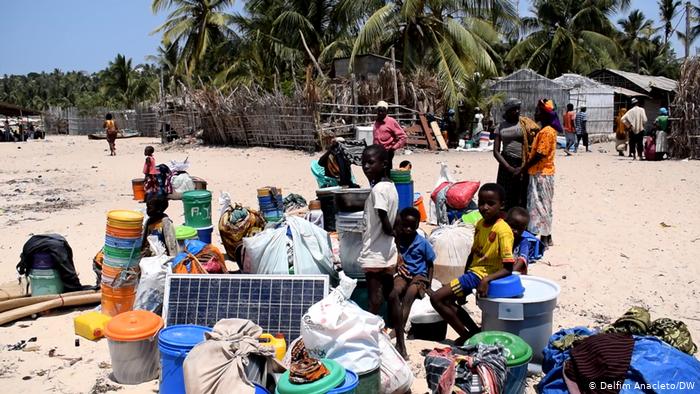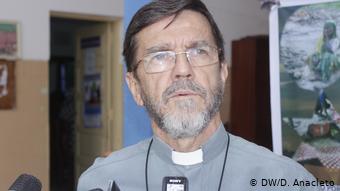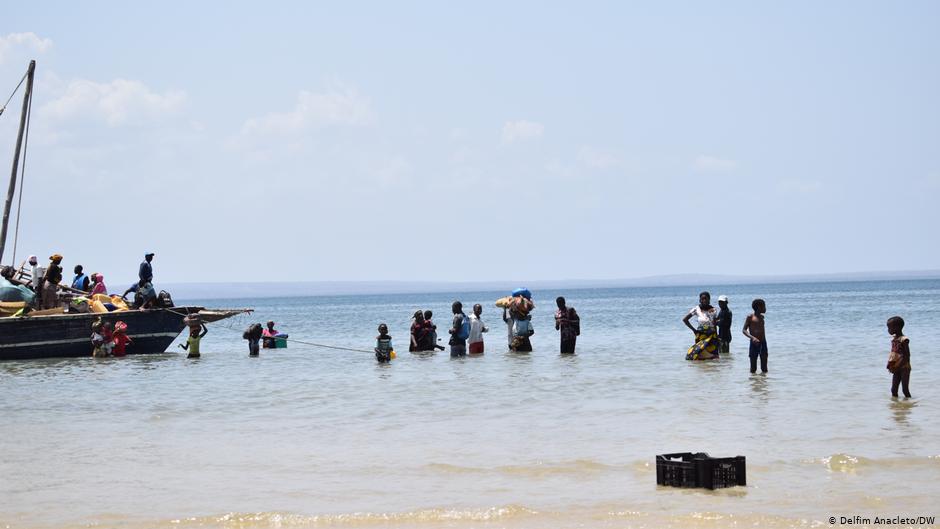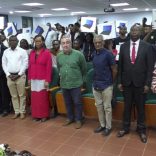Mozambique: UEM hands over 504 laptops to STEM students
Cabo Delgado: “We are in a deep humanitarian crisis and we need solidarity”

Internally displaced persons (IDPs) at Paquitequete beach, Pemba. [Photo: DW]
- According to the bishop of Pemba, the city may be unable to respond to the many displaced victims of the insurgency arriving there. Luiz Fernando Lisboa appreciates the help that arrives, but asks for greater coordination.
It is estimated that, since Saturday (17.10), around 1,000 IDPs have arrived in the city of Pemba, Cabo Delgado, every day as a result of the insurgent attacks in the province.
For the past three years, the northern province of Mozambique has been attacked by terrorists not yet properly identified, who have killed more than 1,000 people.
The difficulties in assisting this new wave of IDPs arriving by sea are great, the Bishop of Pemba claims. Luiz Fernando Lisboa speaks of a deep humanitarian crisis and calls for solidarity and humanitarian aid.
DW Africa: In what conditions do displaced people arrive in Pemba?
Dom Luiz Fernando Lisboa (LFL): The displaced people who have arrived in the last five days arrive in very difficult situations. Most of them arrive dehydrated, some come sick, feeling sick. We had a lady who gave birth in the boat. They arrive in a difficult situation, scared and with few belongings. Those who succeeded in leaving before the insurgents arrived brought what they had, but a good part of them arrive without anything, because they left in a hurry without being able to gather their few belongings. Many people have no documents, they arrive with almost nothing. That is the situation.

DW Africa: Are they receiving the necessary support?
LFL: Yes, they are receiving support. There are people from the [Paquitequete] neighbourhood, the neighbourhood secretary and some organisations, plus some volunteers. They are receiving some support, but not enough, because it took us by surprise. We were assisting the 12,000 IDPs who arrived in Metuge, where two new camps were formed. Now that we have managed to organise the lists, we are assisting people with food, tents, mats and other resources. Then, this took us by surprise. They [newly arrived IDPs] are not yet receiving the necessary support they need. They have been receiving a snack meal, hot tea, but not real, solid food, food which actually feeds them. Some are being sent to families and others, the government is looking at what it will do with them.
DW Africa: Is the team providing psychological support to displaced people involved in supporting people who arrive in this new wave?
LFL: The psychological support team was trained by two of our psychologists, two psychologist sisters. Four groups have already been trained and, in the last two days, a fifth group is being trained. So, this group is attending the camps where those who have been displaced for about two months have been sent. This team has not yet come to these people on the beach, because it is not relevant to give that support now. First, they have to open a file, they have to be welcomed, they receive food, and then they can start this work. This work is not done immediately when people arrive – there are other things that have to be done before that. But the team is ready to give that support later. We are doing this work in Metuge, but the idea is to start this work in the neighbourhoods of Pemba, because there are many, many families there.

DW Africa: If an avalanche of displaced persons continues to arrive, what do you foresee for the city and in terms of humanitarian assistance?
LFL: Pemba is already overcrowded. If this avalanche of refugees continues to arrive, we foresee a city completely flooded with people without having the necessary sanitary and physical conditions. I will not say that the population in Pemba has doubled, but it is said here that there are more than 80,000 displaced people in Pemba. So, imagine a small city that was not prepared for this. The more people arrive, the worse the situation gets. In terms of humanitarian assistance, it is very difficult, because these people are entering into families that had already been registered. It is work that has to be continually restarted, corrected. It is very hard work for humanitarian organizations and for the government itself.
DW Africa: In Maputo, the waves of solidarity with the displaced are growing. What has been their contribution here?
LFL: It is true that the support and solidarity of many people in society has grown, both individuals and groups – organisations, entrepreneurs, many people have this desire to help. It is a pity that there is no concentration of forces. Much aid is too dispersed. For example, one group helps with 100 loaves, another with 200 and another with 300… . If we put it all together, we could make food, rice or beans and ‘xima’. So, coordination is still lacking, which is understandable because more people come in to help, especially small organizations.

All the help is valid, it is important to say. There are many people working in solidarity, there is much more openness. The people of Cabo Delgado, in the first place, are to be congratulated for their hosting, for their solidarity. Nobody is counting; everyone is sharing. And a lot of aid has come from outside Pemba, outside the province and even outside the country, adding to what we are getting and that is responding to this situation.
So, I take this opportunity to thank all the people who have been concerned about our situation. We are truly in a deep humanitarian crisis and we need solidarity. So, I want to invite people of good will to join groups of friends, businesspeople, to get in touch with us. We need support, we need help. There are a lot of people to be assisted and who need everything, but right now we are taking care of the most basic needs, which is food and a place to stay. Not even those essential have we achieved for everyone So, we still need to deepen solidarity and humanitarian aid so that we can give that response. Thank you very much.











Leave a Reply
Be the First to Comment!
You must be logged in to post a comment.
You must be logged in to post a comment.